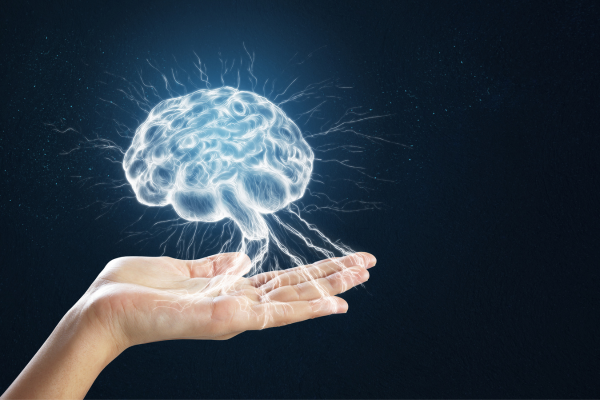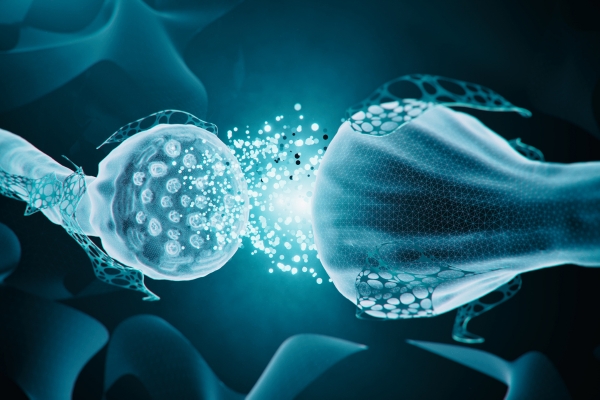In the high-speed chase of modern life, the GABA supplement emerges as a biological rebel, offering calm in a capsule-free form.
This natural tranquilizer, nestled within our neurons, challenges the pharmaceutical grip on our quest for peace.
Is the secret to serenity not in a prescription, but in the very fabric of our brains?
GABA’s controversy stirs a bold conversation: Are we overlooking nature’s simplest solutions in our complex lives?

Understanding GABA
Gamma-Aminobutyric Acid (GABA) stands as a cornerstone in the complex architecture of our nervous system.
At its essence, GABA is a neurotransmitter, a chemical messenger that facilitates communication between neurons in the brain.
Its structure is simple yet pivotal: as an amino acid, it plays a fundamental role in brain metabolism, influencing how brain cells interact and respond to stimuli.
Role of GABA as an Inhibitory Neurotransmitter
GABA’s claim to fame lies in its role as the central nervous system’s primary inhibitory neurotransmitter.
In a realm where neurons are constantly firing and communicating, GABA acts as the calm amidst the storm.
When GABA binds to its receptors on neurons, it effectively inhibits or reduces their activity, preventing overexcitation and maintaining a balance in neuronal firing.
This inhibitory action is crucial for regulating muscle tone, reducing stress and anxiety levels, and fostering a state of calm and relaxation.
Balancing Act: GABA and Excitatory Neurotransmitters
To fully appreciate GABA’s role, it’s essential to understand its counterbalance in the nervous system: excitatory neurotransmitters, with glutamate being the most prominent.
While GABA dials down neuronal activity, excitatory neurotransmitters like glutamate turn it up, promoting neural activation and communication.
This yin and yang relationship between GABA and glutamate is fundamental to the brain’s functioning, orchestrating a delicate balance between excitation and inhibition.
This equilibrium is vital for learning, memory, and overall brain health.
Disruptions in this balance can lead to neurological and psychiatric conditions, highlighting the critical nature of GABA in maintaining our brain’s harmony and well-being.

The Science of Calm: How GABA Works
GABA works like the brain’s own soothing melody, turning down the volume on excessive neural activity that can lead to anxiety and restlessness.
When GABA molecules are released into the space between neurons (known as the synaptic gap), they bind to specific sites on the neighboring neuron.
This binding action sends a signal to the neuron that essentially says, “Take a break; relax.”
This process decreases the likelihood of the neuron firing off an excitatory message, leading to a calming effect on the brain.
This natural damping of brain activity is what helps to alleviate feelings of anxiety and promotes relaxation.
GABA Receptors
GABA operates through two main types of receptors, named GABA_A and GABA_B.
Think of these receptors as specialized docks on the neuron’s surface, where GABA molecules can land.
GABA_A receptors are like the brain’s immediate response team.
When GABA binds to these receptors, they quickly open channels that allow negatively charged chloride ions to rush into the neuron, making it less likely to fire.
This action contributes to fast-acting relaxation effects, such as the immediate calm one might feel after a deep breath.
GABA_B receptors work more slowly and are involved in the prolonged soothing effects of GABA.
They reduce the activity of certain calcium channels and open potassium channels, leading to a longer-lasting decrease in neuron excitability.
This contributes to sustained feelings of calm and can help regulate stress over time.
GABA Levels and Mood Disorders
The balance of GABA in the brain is more than just a matter of feeling relaxed; it’s crucial for our overall mental health.
Low levels of GABA have been linked to various mood disorders, including anxiety, depression, and even conditions like epilepsy.
When there isn’t enough GABA to go around, or if the receptors aren’t working correctly, the brain’s excitatory signals can go unchecked, leading to heightened states of stress, anxiety, and susceptibility to mood swings.
This delicate balance of GABA in our system underscores its vital role not just in momentary calm, but in long-term emotional and neurological health.
Understanding and maintaining this balance can be key to managing mood disorders and fostering a state of mental well-being.

Benefits of GABA
While GABA is often spotlighted for its calming effects, its benefits extend across a broad spectrum of our well-being.
This tiny molecular hero plays a significant role in various aspects of our mental and physical health, proving that its influence goes far beyond just helping us unwind.
Sleep Quality
One of GABA’s standout roles is in promoting better sleep.
By dialing down the brain’s nocturnal chatter, GABA helps usher in a state conducive to sleep.
This doesn’t just mean falling asleep faster; it also contributes to the quality of sleep, allowing for a more restful and rejuvenating night. [1]
For anyone tossing and turning with a mind that won’t quiet down, GABA might just be the internal lullaby needed for those elusive Z’s.
Stress Relief and Mood Regulation
In the turbulent seas of daily life, GABA serves as a vital anchor, offering stability amidst emotional storms.
Its ability to reduce neural excitability translates into a potent form of stress relief, providing a buffer against the minor irritations and major upheavals we face.
Furthermore, by maintaining a balanced mood, GABA helps in navigating life’s highs and lows with greater resilience, making emotional well-being more attainable. [2]
Cognitive Functions and Neurological Health
Beyond its calming prowess, GABA plays a subtle yet significant role in maintaining cognitive functions and overall neurological health.
By preventing our neurons from becoming overexcited, GABA ensures that the brain’s signaling remains precise and efficient, akin to keeping a complex machine well-oiled.
This optimal functioning is crucial for tasks that require focus, memory, and quick thinking, making GABA an unsung hero in our cognitive toolkit.
Moreover, the balance of GABA in the brain is critical for neurological health.
Disruptions in GABA’s balance are associated with various neurological conditions, underscoring its role in maintaining not just mental tranquility but also the fundamental health of our nervous system. [3]
Enhancing Memory and Focus
GABA’s impact on the brain also extends into the realms of memory and focus, acting as a critical component in sharpening mental functions.
By modulating neuronal activity, GABA contributes to a more focused state of mind, reducing the background noise of neural activity that can distract from tasks at hand.
This effect allows for clearer concentration and the ability to hone in on specific tasks without the constant pull of scattered thoughts.
Moreover, GABA plays a role in the consolidation of memories, an essential process for learning and retaining information.
By creating a calmer neural environment, it facilitates the brain’s ability to process and store new information more effectively.
This doesn’t just mean better recall of facts and details; it also means more efficient learning processes and a greater capacity to build on existing knowledge.
For students, professionals, and lifelong learners alike, GABA’s influence on memory and focus can be a game-changer, providing the mental clarity needed to navigate complex information and tasks. [4]

Unlock Your Brain’s Full Potential with Neuro Thrive
Elevate your cognitive potential with Neuro Thrive, the premium supplement designed to enhance memory, focus, and overall brain health.
Infused with the power of GABA, alongside cutting-edge ingredients like PQQ, Alpha GPC, and Bacopa Monnieri, Neuro-Thrive is your daily ally in achieving peak mental performance.
Whether you’re aiming to sharpen your focus, improve memory retention, or simply support your brain’s well-being, Neuro Thrive offers a synergistic blend of nutrients tailored for optimal cognitive enhancement.
Don’t let brain fog and distractions hold you back.
Embrace the clarity and concentration you deserve with Neuro-Thrive.
Try it now and feel the difference in your mental acuity and focus.
Your brain’s peak performance is just a capsule away.
References
- Byun JI, Shin YY, Chung SE, Shin WC. Safety and Efficacy of Gamma-Aminobutyric Acid from Fermented Rice Germ in Patients with Insomnia Symptoms: A Randomized, Double-Blind Trial. J Clin Neurol. 2018 Jul;14(3):291-295. doi: 10.3988/jcn.2018.14.3.291. Epub 2018 Apr 27. PMID: 29856155; PMCID: PMC6031986.
- Hepsomali P, Groeger JA, Nishihira J, Scholey A. Effects of Oral Gamma-Aminobutyric Acid (GABA) Administration on Stress and Sleep in Humans: A Systematic Review. Front Neurosci. 2020 Sep 17;14:923. doi: 10.3389/fnins.2020.00923. PMID: 33041752; PMCID: PMC7527439.
- Koh, W., Kwak, H., Cheong, E. et al. GABA tone regulation and its cognitive functions in the brain. Nat. Rev. Neurosci. 24, 523–539 (2023). https://doi.org/10.1038/s41583-023-00724-7
- Yoon JH, Grandelis A, Maddock RJ. Dorsolateral Prefrontal Cortex GABA Concentration in Humans Predicts Working Memory Load Processing Capacity. J Neurosci. 2016 Nov 16;36(46):11788-11794. doi: 10.1523/JNEUROSCI.1970-16.2016. PMID: 27852785; PMCID: PMC5125231.

